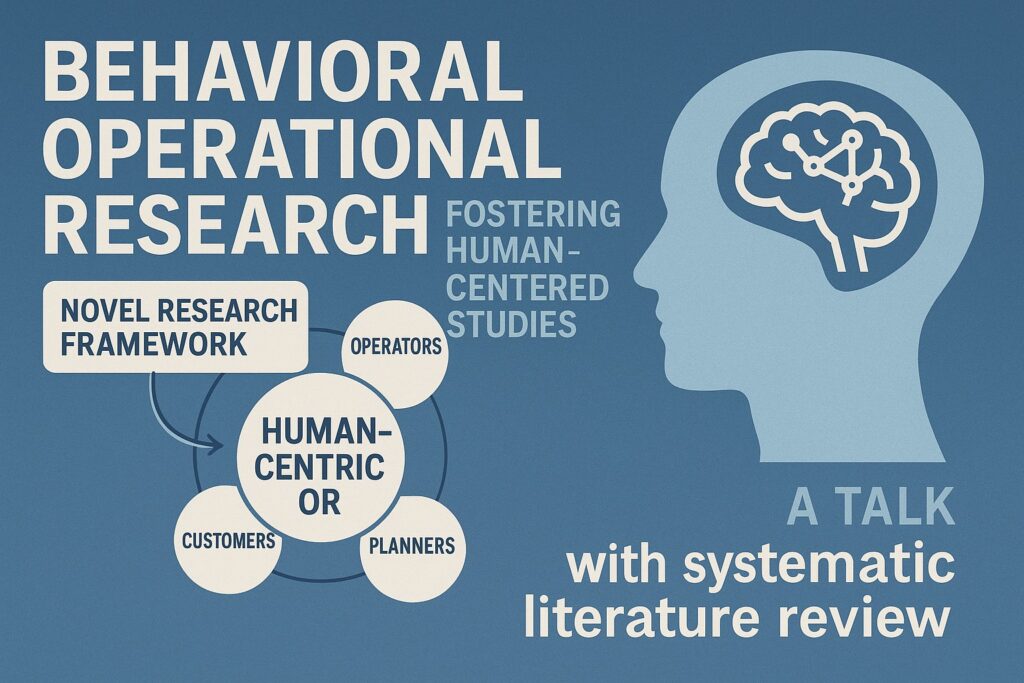
This seminar series was created to foster collaboration, strengthen BOR community, raise interest for BOR topics, increase the visibility of BOR, and fast delivery of new ideas.
The seminars are scheduled for 40 min. The generic timetable suggests a brief introduction (5 min), a contribution (20 min), and a discussion (15 min). However, there is flexibility concerning the length of the contributions. In addition, there is an opportunity for interested in staying in the room to continue discussions.
The seminar takes place during “Brownbag-time for Europeans”
12 PM to 12.40 PM (UK GMT)
1 PM; to 1.40 PM (CET, Berlin)
It is scheduled bi-monthly every 2nd Thursday every second month under consideration of other workshops, conferences, etc. The next dates are the following:
October 9th 2024, December 12th 2024
February 13th 2025, April 10th 2025, June 12th 2025, October 9th 2025, December 11th 2025
Different types of contributions are possible: Conference talks – work in progress, Mini-panel discussions with pre-assigned panelists, Open discussion with initial input of one contributor, Editors of journals discussing publishing BOR papers, Find collaborator – e.g., Ph.D. students present their work and look for a collaborator they could benefit from
Please reserve your BORB2S2 presentation date! Only an abstract of the talk is needed. Topics can cover any facets of BOR. Self-promotions are highly welcome. You can also suggest other speakers. Send all enquiries to Johannes Siebert (Johannes.Siebert (at) mci.edu)
-

BORBS XX: Guiding the Early Design Phases in BOR: A “fast lane” for future BeOps/BOR studies
Anita Onay (MCI Management Center Innsbruck) (presenting author); Christina Stampfer (MCI Management Center Innsbruck), Marcus Brandenburg (Flensburg University of Applied Sciences), Johannes Ulrich Siebert (MCI Management Center Innsbruck)
Abstract
Human aspects are gaining increasing impact in the ongoing debate on key themes in production planning research, which aligns with the emphasis on the human-centricity of the Industry 5.0 strategy as a facilitator of the European Union Commission’s priorities. Despite this growing recognition of humans as an integral part of any production system—whether as operators, designers, planners, or customers—production planning research still often lacks a rigorous human-centric analysis. To address the lack of human-centered research in the field of production planning, behavioral operational research (BOR) and behavioral operations (BeOps) provide fruitful theory, methodology, and research methods. This present study aims to pursue a systematic literature review (SLR) on BOR and BeOps research focusing on production planning problems. The result and synthesis of a content analysis including 132 papers provides insights into (i) key themes of the research landscape and (ii) human-centered research frameworks—aiming to serve as a guiding reference and “fast lane” for future BeOps/BOR studies, primarily to support the early design phases. Our SLR indicates that, within research frameworks, it is fruitful to distinguish whether human aspects are addressed as human behavior (e.g., performance, decision making), human factors (e.g., bias, emotion), or an integration of both, as each point of emphasis offers unique contributions for future studies. Approximately two-thirds of the articles in our sample explicitly incorporate human behavior as a central point of interest. Therefore, we strongly encourage researchers to explicitly focus on investigating human behavior in their research design, while the inclusion of human factors delivers important explanatory power for the manifestation thereof.
Why should you join?
By joining, you’ll get easy-to-follow guidance for future studies, especially in the important early planning stages. You’ll also help us test and improve our new framework together, so your ideas really matter. It’s a great chance to learn, share your own experience, and connect with others working on similar
October 9th, 2025
12 PM to 12.40 PM (UK, London)
1 PM; to 1.40 PM (CET, Berlin)
https://us02web.zoom.us/j/89143663283?pwd=kxdJrqXHfZ0O2nJVPL7TgfCBfuJtRq.1
Meeting-ID: 891 4366 3283
Kenncode: 1
Comment: In case of technical problems, please visit https://www.euro-online.org/websites/bor/behavioral-operation-research-brown-bag-seminar-series/ before the start of the meeting.
-

Authors: Kai Bellmann (presenting authors), Lisa Scholten, Gerdien de Vries (Delft University of Technology)
Abstract
Urban areas face an increasing urgency to adapt to climate change, yet adaptation efforts remain insufficient. Addressing this adaptation gap requires an understanding of the psychological mechanisms and contextual influences shaping climate adaptation behaviour. Whereas behavioural scientists have explored citizens’ climate adaptation behaviours, the decision-making of policymakers is often overlooked despite its importance in closing the adaptation gap.
To address this, we conducted a behavioural systems analysis to uncover behavioural dynamics that shape policymakers’ decision-making, based on 32 semi-structured interviews and a workshop with Dutch urban climate adaptation policymakers. Combing thematic and content analysis with behavioural system mapping, our results highlight the importance of an integrated, dynamic system approach to understand psychological and contextual influences on policymakers’ decision-making. We identified nine central themes reflecting key behavioural dynamics. Furthermore, analysis of behavioural influences using the Theoretical Domains Framework identified policymakers’ beliefs about consequences, environmental context and resources, and goals as most influential determinants of behaviour. Behavioural system mapping revealed three impactful levers for behavioural interventions to improve decision-making in urban climate adaptation.
By integrating behavioural insights and systems analysis, this work proposes a novel approach to analyse contextual, dynamic influences and determinants of behaviour that shape adaptation policymaking. Therefore, it aligns with recent calls from behavioural scientists highlighting the need for systemic approaches in behavioural science.
Why should you join?
- Discover how behavioural system mapping can be utilised to understand behavioural dynamics, integrating behavioural science and systems analysis.
- Learn about the factors and dynamics that shape policymakers‘ decision-making in urban climate adaptation.
June 12th, 2025
12 PM to 12.40 PM (UK, London)
1 PM; to 1.40 PM (CET, Berlin)
https://us02web.zoom.us/j/89143663283?pwd=kxdJrqXHfZ0O2nJVPL7TgfCBfuJtRq.1
Meeting-ID: 891 4366 3283
Kenncode: 1
Comment: In case of technical problems, please visit https://www.euro-online.org/websites/bor/behavioral-operation-research-brown-bag-seminar-series/ before the start of the meeting.
-

Maura E Halstead (presenting author), Manuel Lopez-Ibanez, George Farmer, and Paul Warren
Abstract
When designing new operations research (OR) methods, it’s crucial to consider how the human decision-maker will actually use these methods. Some methods that consider the human element assume that humans will make suboptimal decisions and offer ways to avoid such decisions. This assumption for suboptimal behavior is known as cognitive bias and comes from simple tasks in the psychology of judgment and decision-making. However, this domain revolves around simple tasks that do not measure or consider factors relevant to OR methods. As a result, we do not know if, when, how, or why cognitive biases occur in OR settings. Without this knowledge, we cannot reliably create methods or processes to overcome such behavior. This presentation will discuss one specific cognitive bias and demonstrate how behavioral experiments benefit the OR community.
Why should you join: Participants will learn why it is important to study cognitive phenomena in OR. They will also see the benefits of conducting such research.
Why should you join?
- Participants will learn why it is important to study cognitive phenomena in OR.
- They will also see the benefits of conducting such research.
April 10th, 2025
12 PM to 12.40 PM (UK, London)
1 PM; to 1.40 PM (CET, Berlin)
https://us02web.zoom.us/j/89143663283?pwd=kxdJrqXHfZ0O2nJVPL7TgfCBfuJtRq.1
Meeting-ID: 891 4366 3283
Kenncode: 1
Comment: In case of technical problems, please visit https://www.euro-online.org/websites/bor/behavioral-operation-research-brown-bag-seminar-series/ before the start of the meeting.


